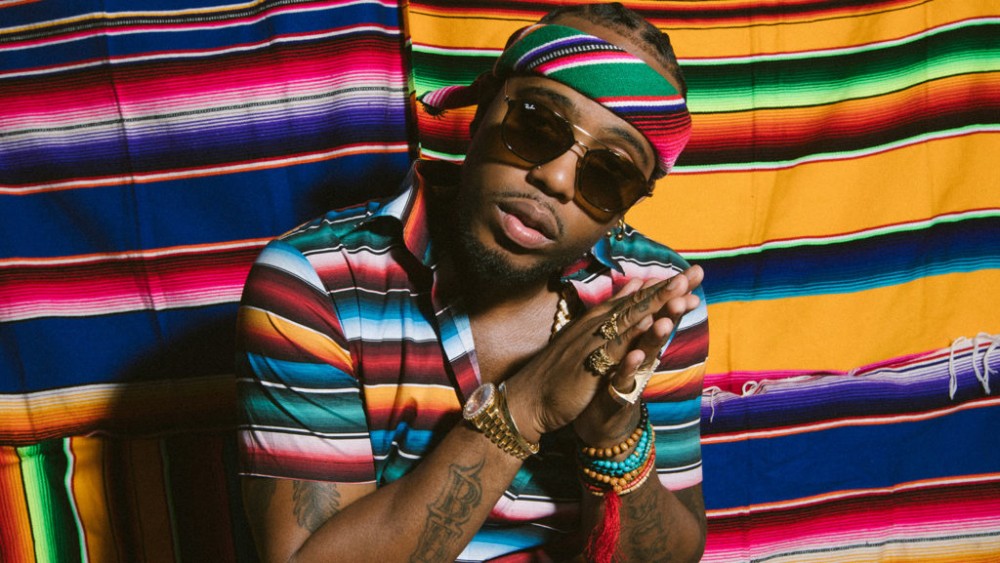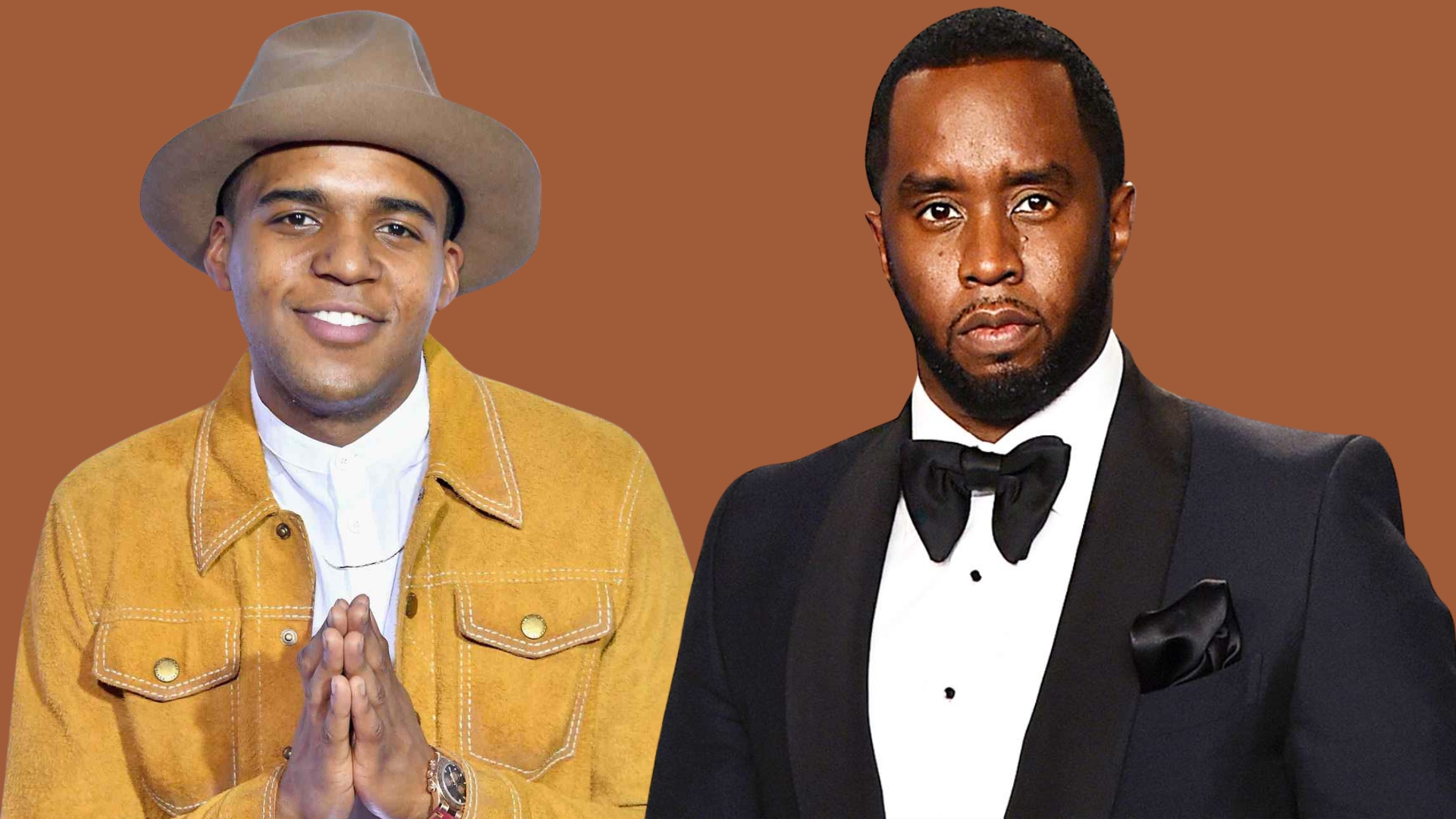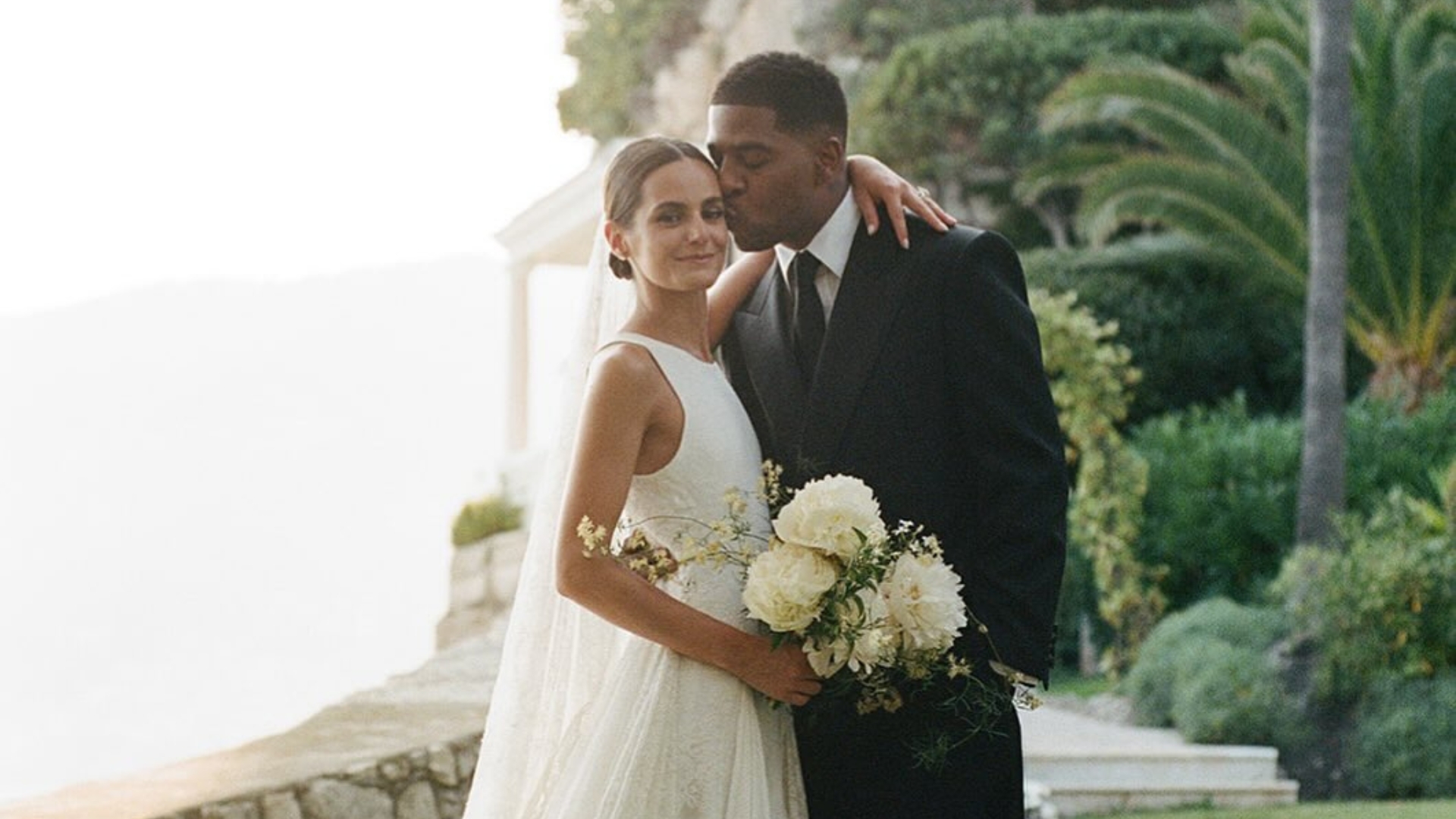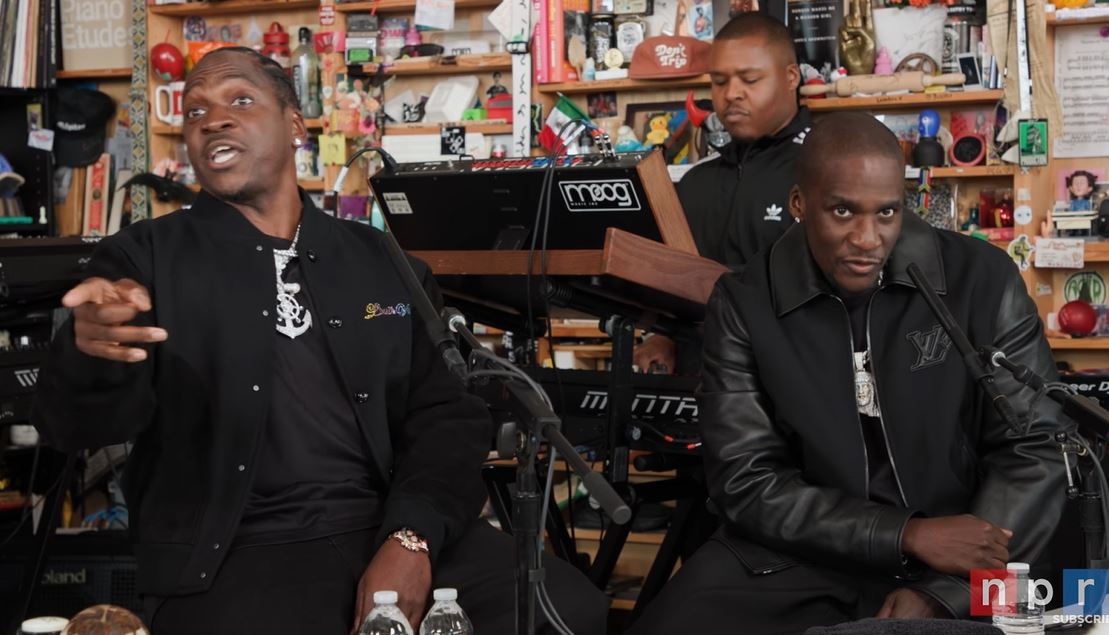Thanks to star-studded debut album 'The Adventures of Bobby Ray,' B.o.B started the 2010s at a commercial peak. It hasn’t always been smooth sailing since, but he’s kicking off the decade with a clear mind: “I don’t feel like I’ve ever been where I’m at now.”
There’s something about the wide array of accolades and oddities from the past decade of B.o.B’s life that feels perfectly adept for tri.
Who was the only male solo artist in 2010 besides decade-defining superstars Drake and Justin Bieber to top the Billboard 200 with his debut LP? That’s B.o.B. Who tapped Morgan Freeman for a spoken word verse — the only vocal recording credit of his illustrious career, per DSPs — in 2012? B.o.B again. Who was the target of Neil DeGrasse Tyson’s diss track “Flat to Fact” in 2016? Believe it or not, that exists, and B.o.B is the answer there as well.
Ten years ago, B.o.B probably wouldn’t have guessed he’d be the answer to any of these questions, either. He started the decade living in his mother’s apartment in Decatur, Georgia, roughly a 15-minute drive from Atlanta. His late ‘00s had started promisingly, as he signed with Atlantic Records in 2006, landed a feature in 2008 on T.I.’s “On Top of the World” from the Grammy-nominated Paper Trail — also performing the track at the BET Hip-Hop Awards — and he even made the soundtrack on Madden NFL 2010. But between the massive economic recession striking at the time and an early breakthrough hit proving elusive, he moved back home.
“I couldn’t really make music in the apartment because the walls were paper thin, so they were threatening to kick us out,” B.o.B recalls to Billboard. “I was close to not making it.”
The limit on output was unfamiliar territory for the then-22-year-old — between June 2007 and February 2010, he dropped two EPs and a whopping five mixtapes. Luckily for him, he was also just a few months away from releasing his already-recorded debut studio album, The Adventures of Bobby Ray, titled after his birth name, Bobby Ray Simmons.
The project, which celebrated its 10th anniversary last week, is filled to the brim with Atlantic labelmates that were either household names (Weezer frontman Rivers Cuomo, T.I., Paramore leader Hayley Williams) or about to be (Bruno Mars, Janelle Monáe). It packed three top 10 hits into the Hot 100 at a time when hip-hop required a deft balance between rap verses steadied by overwhelmingly catchy pop hooks in order to compete with the dance-pop that littered the top of the chart. Seemingly all at once, B.o.B was one of the biggest names in the music industry, and a budding artist with a firm grasp on what was sonically driving chart success.
“It was a landmark album for its time,” says Atlantic Records chairman and CEO Craig Kallman. “It showcased an artist who had the dexterity and agility to speak to a core hip-hop fan base, but at the same time, transcend core hip-hop records with global pop smashes and not undermine his credibility.”
But it hasn’t always been easy for him since, as he grappled to deal with his newfound public persona, clashed with the inner workings of the music industry, and in more recent years, received significant blowback to his highly-publicized self-conspiracy theories. Now, as B.o.B, 31, readies his next chapter with a podcast and a forthcoming album, he really only wants one thing: simplicity.
“Just because you don’t see me on every corner like a McDonald’s, that doesn’t mean I’m underrated or slept on,” he says. “I’m a very rare steak that you have to go to a Japanese teppanyaki to get.”
Those most involved with the start of B.o.B’s career now talk about him as if he were a coveted draft prospect. Not only did he possess all of the tangibles, but he brought with him a skill set to differentiate him from anything else around at the time.
In 2006, hitmaking producer Jim Jonsin (“Lollipop,” “Whatever You Like”) had recently started his Rebel Rock record label, which had just entered into a joint venture with Atlantic, and was searching for his first signee. Then, his assistant A&R Rocco Valdes ran into the room wide-eyed and raving about the rapper he’d just discovered. Valdes had heard a few tracks from what would become B.o.B’s mixtape Cloud 9 — he’d met one of B.o.B’s managers a few months earlier at the now-defunct Ozone Awards, which primarily spotlighted southern hip-hop artists — and found just the star that Jonsin was looking for.
“As a label, I didn’t want to sign artists that were puppets — I wanted artists that could stand on their own,” says Jonsin. “B.o.B was a keyboard player, he was producing, he was writing melodies, singing and rapping. He blew me away. He had to be the first artist on Rebel Rock.”
T.I. first learned about B.o.B at his Atlanta nightlife venue, Club Crucial. He’d become must-watch entertainment at the nightclub over a span of several performances, thanks to his unorthodox approach.
“He opened up with a guitar,” says T.I. with a laugh. “In hip-hop that wasn’t being done. There were a lot of us walking around with guitars, but playing them hadn’t been done yet. That was impressive.” In 2008, he added to B.o.B’s label overhead by signing him to Grand Hustle Records.
That said, the litany of releases that B.o.B provided during his first few years signed to the trifecta of labels resonated more seamlessly with record executives than it did with the public at large. Kallman stresses now that building B.o.B’s critical rap fan base was of priority first: the rapper developed himself as a mainstay in the underground hip-hop scene, performing at local clubs, accruing buzz on mixtape release site DatPiff and working his way into the 2009 XXL Freshman Class. But while his mixtapes like Hi! My Name is B.o.B and B.o.B vs. Bobby Ray earned him that core following, nothing was picking up traction on a mainstream level, and it was starting to get to him, says Jonsin.
“B.o.B was really stressed out. There was stress and aggravation and just angst to get things going,” he recalls. “Then ‘Nothin’ On You’ came and it was like, ‘Thank you, God!’ ”
According to former Atlantic A&R Mike Caren, the future No. 1 single came about after then-junior A&R Aaron Bay-Schuck brought the record in from The Smeezingtons, a songwriting and production team that featured Bruno Mars. Atlantic’s top executives knew that they had a hit on their hands, but there was just one problem: they envisioned the track for Lupe Fiasco.
As Jonsin remembers it, Kallman asked for his help to fit the production to Fiasco’s style. Jonsin had a different idea. “I’m trying to figure out where to go with this song, and it’s like, ‘This is an incredible song the way is.’ All I can do is screw this one up, if I’m being honest. So, I called Craig Kallman] and said, ‘Is there a chance that B.o.B could have this record the way it is? It’d be a perfect fit for him.’”
The specifics on how exactly the song ultimately passed from Lupe’s hands to B.o.B’s are unclear — the former had well-documented qualms with the label at the time — but an initial guest verse that B.o.B recorded in L.A. eventually became the crux of the song, and the label later flew Mars to Atlanta to finish the hit. (Lupe Fiasco’s version still exists on the internet.) “I really don’t know what the politics were behind it, but Lupe] ended up just not wanting anything to do with the song,” B.o.B says.
Whatever the reason, there was little doubt about its fate once it became a finished product, with Kallman deeming the track a “one-listen smash,” and Caren adding that it was “pretty obvious immediately that there was an amazing song.”
Things escalated quickly. The piano-laden, syllable-bouncing “Nothin’ On You” debuted in early February, with its magazine-cutout music video arriving the following month. By the end of March, the song entered the top 10 for the first time, kicking off a stretch of 23 consecutive weeks of B.o.B having at least one hit in that region of the chart. “Nothin’ On You” hit the tally’s pinnacle in the first week of May.
The following month, B.o.B followed it up by reaching No. 2 with the unavoidable, early emo-rap hybrid “Airplanes,” featuring Paramore’s Williams; later that summer, he hit the top 10 for a third time in short order with the Cuomo-assisted, high-energy “Magic.” Before he knew it, B.o.B — thanks in part to a handful of superhero-esque features — had amassed a collection of show-ready smashes that could hold momentum for years to come.
“Sometimes, if you’re doing an action movie, you might want to get Marvel behind it,” he jokes, comparing his backing major label to the powerhouse film production company. “If you do it right, you’ll get a song that lasts a career.”
Outside of the eye-popping chart hits, the Billboard 200-topping The Adventures of Bobby Ray also boasted samples of both modern and decades-old hits, flipping Vampire Weekend’s “The Kids Don’t Stand a Chance” (“The Kids”) and Billy Stewart’s 1965 spin on “Summertime” (“Fame”). It tapped rap’s upper echelon in Eminem and T.I. on “Airplanes Pt. II” and “Bet I,” respectively. And it delved into what fans have since deemed prophetic lyrics about his future in the industry on pleading opener “Don’t Let Me Fall” and the skeptical, troubled “Ghost in the Machine.” It all propelled the debut effort to a best rap album nomination at the Grammys — one of five that the album and its singles collected, though none resulted in hardware.
Even so, in the span of a few months, B.o.B went from sharing an apartment to sharing the spotlight with the likes of Drake, Kid Cudi and Wale as the faces of the decade-turning era of genre-blending hip-hop. It was a commercial peak that his career hasn’t reached since.
In retrospect, B.o.B would’ve liked the chance to mentally prepare himself for stardom. Well before his big moment came, he was already having second thoughts about a rise to prominence. “Being famous ain’t all what they make it to be,” he rapped on his track “F–k the Money,” from his 2009 May 25th mixtape. So when the fame did show up, it wasn’t always easy for the new star to deal with his reputation.
“All of a sudden, I have these huge Grammy-nominated records and I’m traveling the world,” he says. “It’s almost like the world didn’t get to discover who I was. I was just these records. That was something that was hard for me to deal with for the longest time.”
The core, underground hip-hop fan base that Kallman encouraged him to hone in on in his early days always remained a focal point for B.o.B, too, and as he piled up the pop hits, he grew increasingly concerned with how he was being viewed within his own community. “I wasn’t that underground B.o.B anymore],” he laments. “I was the ‘beautiful girls,’ cardigan sweater-wearing, Malcolm X glasses B.o.B.”
Recalls T.I., who was serving an 11-month sentence beginning in November 2010 for violating probation: “I remember him coming to see me in prison, and he was like, ‘How do I get the black girls to f–k with my s–t? The shows are selling out, but it ain’t none of us!’”
Things only got more difficult once B.o.B started to work on a follow-up album to The Adventures of Bobby Ray. While B.o.B had much more free reign to lean heavily into hip-hop on the between-album 2011 mixtape Every Play Is Crucial, when it came time to focus on the bigger body of work, B.o.B and his management often pushed back on simply trying to create the next “Nothin’ on You” or “Airplanes.”
Instead, on sophomore album Strange Clouds, he opted to rely more upon the Lil Wayne-featuring, smoke-blowing title track, which debuted in the Hot 100’s top 10 but faded shortly thereafter, along with the club-ready “Ray Bands” and the bar-jousting, Nicki Minaj-assisted “Out of My Mind.” The LP didn’t shy away from the pursuit of a major pop hit follow-up, but it didn’t exactly lean into it, either. Neither of the more radio-geared singles, “So Good” — which contained a “Nothin’ On You”-esque globe-trotting theme — nor “Both of Us,” cracked the top 10.
The latter effort, which combined B.o.B, Taylor Swift and Dr. Luke, felt particularly like it should’ve been a slam dunk. The single did go platinum, but it relegated one of the world’s biggest stars to a forgettable chorus, and never spread like wildfire across the industry as his breakthrough entries had. It’s entirely possible that the lukewarm response to “Both of Us” discouraged B.o.B from wading too far into top 40 waters moving forward, as he seemed less invested in taking cracks at such overtly pop-rooted hits with each passing attempt afterward.
“I was getting further and further away from my connection to the music,” he acknowledges. “I really just wanted to be a rock star at that point.”
B.o.B quickly became a victim of his own success. Starting with such a strong commercial performance seemingly limited his freedom to revel in the explorative qualities that separated him in the first place, or at the very least made him more prickly to the concept of compromising them. When push came to shove, B.o.B simply wasn’t willing to play the game.
“We always used to say: did he get scared of the success of the first] record?” asks Jonsin. “Was it too much? I don’t know. I’ve never asked him that.”
He released one more album with Atlantic in 2013 before the deal sputtered out in the middle of the decade, with the rapper tweeting that he was “suppressed.” He founded his own record label, No Genre, in 2014. Following the digital release of Psycadelik Thoughtz in 2015, he became an independent artist, though he remained an official member of Grand Hustle through 2017 (T.I. still considers him part of the family, and the two remain in contact).
“The whole ‘I’m never going to change!’ is hogwash,” B.o.B says. “If anything you’re supposed to change and grow. Some people aren’t meant to be in your life for all of your life. Some people are. Some people for longer than others.”
A few months ago, B.o.B introduced his new podcast, The BoBCast, co-hosted along with sisters Tiffany and Camaren Burgess. Most episodes of his new forum have been lighthearted in nature, covering everything from memories about drunk guitar battles with Kid Rock to conversations about life in self-quarantine, and inviting everyone from a former collaborator to a reality TV star to a sex worker to participate in the conversations.
In an April 8 episode, B.o.B offhandedly remarked, “I’m at a point in my life where I don’t want to say I’m stuck, but I’m cool with where I need to be.” The comment came as part of a three-hour plus segment during which he seemingly tried to provide an ending chapter to a January 2016 tweet that questioned whether the earth is flat and set the digital world ablaze. It unsurprisingly drew the ire of well-known figures in the science field, like Neil DeGrasse Tyson and Bill Nye the Science Guy. Rather than retract such statements, he doubled down — and asked his followers to do the same. (And that’s to say nothing about some of the other remarks he made at the time that garnered swift outrage.)
“You can’t just come disrupt a fundamental belief structure and say, ‘Everything you’ve always learned is wrong!’ and then leave nothing there,” says T.I. “That’s counterproductive. But I don’t think B.o.B has ever done anything to intentionally hurt or disrespect anybody.”
B.o.B doesn’t regret posing the question. He just wishes he handled his response a bit differently. Given his public image, when his questioning evolved to assertiveness — a pivotal distinction point; just ask basketball star Kyrie Irving — he quickly became a face of the movement and hasn’t been able to shake the image since. Even today, on any B.o.B tweet, livestream or Instagram post, the comment section instantly becomes jammed with the online community looking for guidance from him on various conspiracy theories from every corner of the internet.
“It definitely gets exhausting with people,” he admits, laughing. “When your inbox goes from girls sending you nudes to people sending you philosophy essays, it definitely takes some of the fun out of a cell phone.”
The backlash led to B.o.B, who Jonsin calls “one of the kindest, purest music people that I’ve been around,” taking a step back from the public eye. He temporarily retired from the music business after his 2018 album NAGA, though he’d return less than a year later with its 2019 follow-up, Southmatic. He put the brakes on nearly all interviews. He fell out of touch with some of the collaborators that he rose to prominence with.
“I feel like I would have remained closer to artists like Bruno Mars],” he says. “We were basically nobodies just trying to make it, trading ideas back and forth, cracking jokes. Same with Ty Dolla $ign, though] I was already established. Over time, there’s a lot more red tape that develops when people blow up. There’s so much that can get in between the relationships. People just want to know that the appreciation goes both ways, but] sometimes it’s hard to really articulate that once the fame train takes off.”
When he calls in mid-April, he notes that he just wants “to focus on what I’m excellent at doing” now. He’s less concerned with trying to stack his plate with too many side hustles — he’s lost interest in the acting and clothing-line ambitions he held five years ago, but still has tentative plans to create a documentary and write a book at some point — and more intent on getting the most out of everything that he interacts with. And given that he’s picking up pizza from Chuck E. Cheese, which he deems the best around, at the time of our call, his day-to-day life doesn’t need to be exorbitant, either.
“I would love for my life to be like when you go to a real fancy, futuristic hotel,” he continues. “One alarm clock. One TV. I want to focus on compact and potent lyrics. Real simple things but they mean a lot. Less is more.”
The immediate future will see the release of his new album, Somnia, which is currently without a release date but is “coming very soon” and will be filled with “more stories and retrospective” about his time in the limelight. He’s not making any concrete plans about what the next decade holds for him, though he notes that being in his thirties gives him a new perspective for music that he could never have held in his twenties.
Over the course of a decade and a half in the industry, it’s unclear if anyone has been able to fully understand B.o.B — but that’s always at least partly been an intentional act. On the third track of The Adventures of Bobby Ray, “Past My Shades,” B.o.B sings on the chorus, “I play my role and never, ever speak it, like a secret/ And all the while you just try to figure me out.” The role has shifted a number of times — and it’ll probably change again a few times before he’s done in the industry for good. But for seemingly the first time in his career, he’s come to terms with just exactly how he fits into the business.
“As an artist, you’re always looking to get better, get more fans, more notoriety,” B.o.B reflects. “You’re trying to challenge yourself. And sometimes you have to come to terms with whatever happens. I’ve accepted that wherever I am is where I need to be. There are no mistakes, there are no f–k-ups.”



